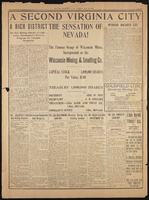Search the Special Collections and Archives Portal
Search Results

Meeting minutes for Consolidated Student Senate University of Nevada, Las Vegas, October 17, 1985
Date
Archival Collection
Description
Text
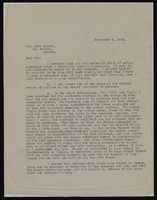
Correspondence, Thomas Toland to Levi Syphus
Date
Archival Collection
Description
Text

Contract, Instrument transferring interests in real and personal property, Las Vegas Land and Water Company, Audit No. 5351, June 1, 1954
Date
Archival Collection
Description
Release of all rights, licenses, leases, contracts, etc., of the Las Vegas Land and Water Company to the Las Vegas Valley Water District. Notarized by Louis Scholnick in Douglas County, Nebraska on June 3, 1954.
Text

Transcript of interview with Kevin Brady by David G. Schwartz, September 7, 2016
Date
Archival Collection
Description
Text
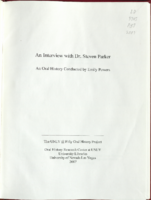
Transcript of interview with Dr. Steven Parker by Emily Powers, December 19, 2006
Date
Archival Collection
Description
Text
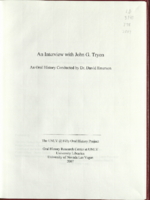
Transcript of interview with John G. Tryon by Dr. David Emerson, February 21, 2006
Date
Archival Collection
Description
Text

Margo Knowles interview, March 25, 1981: transcript
Date
Archival Collection
Description
From the Ralph Roske Oral History Project on Early Las Vegas, OH-01039. On March 25, 1981, collector Sonny Neighbors interviewed his mother, Margo Knowles (born October 13th, 1935 in Cedar Rapids, Iowa) at her home in Las Vegas, Nevada. Margo speaks about growing up and going to school in Las Vegas. She also discusses her work as a telephone operator in Las Vegas, and at the Nevada Test Site in Nye County, Nevada.
Text
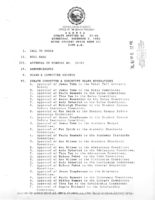
Meeting minutes for Consolidated Student Senate University of Nevada, Las Vegas, December 2, 1992
Date
Archival Collection
Description
Text
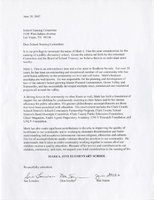
Application and supporting documents for the naming of Mark L. Fine Elementary School, 2007
Date
Archival Collection
Description
The application and supporting documents provide details about Mark Fine and his contributions to Clark County and Las Vegas, Nevada. There are letters of support from many members of the community, including his children and elected officials, and from leaders in religious groups, non-profit organizations and business enterprises.
Text

